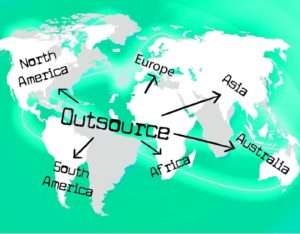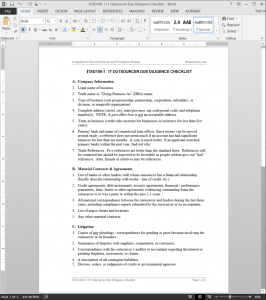What are Best Practices for Outsourcing in Your Business?

Hiring a third party to perform outsourced business tasks on your account often means you’re exposing your business to new risks such as confidentiality breaches. Thinking ahead to formulate a clear outsourcing procedure can save your business a lot of money, time, and even a legal case. What are best practices for outsourcing in your business?
How To Implement The Best Practices For Outsourcing In Your Business
With more companies choosing to outsource parts of their business processes, the focus is shifting from the benefits of outsourcing to how to do outsourcing the right way. For a business to enjoy benefits such as reducing overhead costs, improving time management, and boosting its employees’ productivity, it must first have a streamlined structure and regulations that support its outsourcing operations – or risk it all falling apart.
Draft Clear And Concise Process And Policy Documentation For Outsourced Staff
Is outsourcing good for business? When outsourcing critical business processes and tasks, it’s important that you have a clear contract of expectations in place. Failing to clarify expectations in an outsourcing arrangement is a common mistake, but one that can lead to disastrous consequences later down the road. Consequences can include the sharing of confidential information, missing deadlines, and misunderstandings about the price.
In an Outsourcing Handbook released by Deloitte, it was shown that organizations often fail to realize the perks of outsourcing unless they establish an effective governance process and manage the legal, financial and commercial risks of outsourcing. This can partly be done by drafting key outsourcing documentation before agreeing on contracts with an independent worker or outsourcing supplier.
This includes a nondisclosure or confidentiality agreement to protect sensitive business information, along with a contract and process document that outlines standard HR protocol for reporting issues; deadlines; and key reporting personnel.
Match Your Outsourcing Provider To Your Specific Criteria
A large part of making outsourcing a success relies on choosing the right outsourcing provider. Not only does this involve doing your research on the outsourcing options available, but it also includes taking time to assess your own business, and its strengths, weaknesses and culture. While it may be tempting to choose the cheapest outsourcing options, it’s not always the best option, since it clashes with business goals like providing 24-hour customer service or IT support.
Before choosing an outsourcing supplier, conduct an assessment to identify business goals, the financial benefits of outsourcing, and its impact on key stakeholders, such as loss of control. Be ready to recognize signs your business should be outsourcing, instead of driving them.
For instance, if you’re finding it difficult to deal with specialized projects or your team does not have the expertise required for an upcoming project, it may be time to outsource.
However, what’s more important during the assessment phase is to build your outsourcing provider must-have list based on your business objectives, and not the other way around. For instance, if you want to outsource your software or web development, think of what you expect from your outsourcing model when researching the variety of web and application design firms. If you’re okay with relinquishing full control for a project, then a fully managed software development outsourcing provider may be a good fit.
Prioritize Data Regulation And Confidentiality Requirements 
Finally, one downfall for outsourcing arrangements is the risk of security and information breaches that it can present. Before signing an outsourcing contract, be clear on how your provider or contractor handles sensitive information such as project reports, budgets and traffic data.
To address data privacy concerns when outsourcing, bring up potential cybersecurity training with your outsourcing provider. Ensure you are adhering to regulatory compliance laws as well, such as international data transfer laws (if you choose to outsource internationally).
Best Practices For Outsourcing In Your Business
There are many trends that will shape your business. Outsourcing is one that can be incredibly beneficial to your business if it’s done right. By following some of the best practices for outsourcing, you can minimize the bumps in the road and maximize the value it adds to your business operations.
















It was helpful when you mentioned the importance of clarifying the processes and tasks that the business owners need to be done and establishing a contract. This is helpful because outsourced parties usually have more than one client, and they need proper communication so that they can deliver what is needed on time. If I ever start a company and choose to outsource, I’ll be sure to do this.